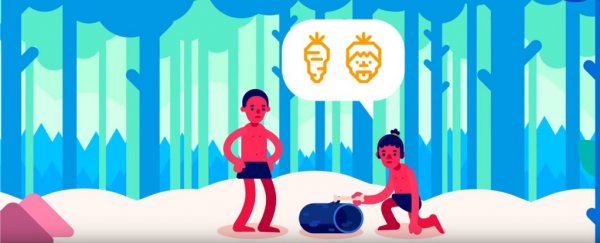While our everyday lives can seem boring and mundane sometimes, if you actually think about all of the cool stuff we have – the internet, aeroplanes, houses filled with everything we need to survive – humanity is actually amazing, but how did we get here?
Well, wonder no more, because Kurzgesagt is back with another video explaining how humanity managed to leave the forests and go on to build skyscrapers and iPads, essentially changing the planet in a way that negates our primal need to fight for survival.
The story of humanity – and the video above – starts way back some 6 million years ago, when an early ancestor of humanity broke off from the apes. Jump forward to about 2.8 million years ago, and the genus Homo emerged, separating humans from other primates.
To get to our species – Homo sapiens – you have to make another evolutionary jump to about 200,000 years ago. At this point, there were at least six other species of humans wandering the planet. These different species were similar to us in many ways, though intelligence level and physical appearance often changed from group to group.
One of the most successful human species was Homo erectus, which existed for over 2 million years – 10 times longer than our species has existed. Despite some groups succeeding, all other human species died off some 10,000 years ago.
Researchers aren't entirely sure what caused this disappearance, but the two main hypotheses are that other human species either couldn't adapt to new environments – causing them to starve to death – or there were wars between the species, leading to genocides.
If you were to jump back 300,000 years ago, the video explains, you'd find communities of humans doing pretty much the same stuff we do today (minus the emojis). Back then, tribes made camps, hunted, made tools, buried their dead, and spoke to one another in some type of early language.
The ability to speak and – in some form or another – write allowed humans to pass on information from person to person and generation to generation. This is what truly separates us from other animals on this planet. Sure, animals pass on survival skills that become instinctual, but the ability to – in detail – describe how to hunt, say, a mammoth, is a much faster and more effective way.
The video uses the example of a skyscraper because if people had already figured out how to build a house, making a skyscraper structurally sound would be nearly – if not fully – impossible.
But, since our ancestors knew how to build a house, they wrote down the instructions, which were then picked up and added to by the next generation. Over time, it's easy to see how understanding how to build a house will eventually lead to an understanding of how to build a megastructure.
Having these abilities led to an innovation boom some 50,000 years ago. Around this time, tools started to become way more advanced, and societies started to blossom rapidly, though no one is sure what sparked such a sudden surge.
Skip ahead to about 12,000 years ago and another major innovation took place: agriculture. Farming rapidly changed humanity because society was no longer dependent on hunting and gathering. Instead, humans learned to change the world to provide them with sustainable food all year long.
Eventually, these early cities grew enough that they started to communicate with one another, causing exponential growth in development because people could share ideas and build upon them, making them better and better all the time.
From there, humanity underwent a series of 'revolutions' that paved the way for today's world. For example, 500 years ago, the scientific revolution set the groundwork for modern physics, astronomy, and biology. A short time later, the industrial revolution transformed the world again into basically what we have today.
It's truly remarkable when you think about how much humanity has accomplished in a few hundred thousand years. In fact, what humanity has achieved since the scientific revolution alone is astounding. We can now connect with anyone on Earth in a matter of seconds, allowing us to share ideas at a rate that our ancestors could never have imagined.
All of our basic needs are pretty much met – at least compared to early civilisation – and we have had people walk on the Moon.
Check out the video above to hear about humanity's origins in greater detail, and, if you're feeling like life is a bit dull today, remember just how amazing everything is.
